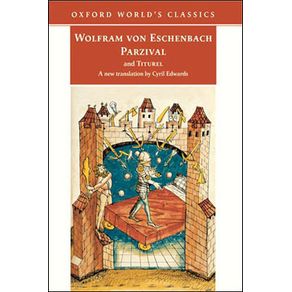Vast in its scope, incomparably dense in its imagery, Parzival ranks alongside Dante's Divine Comedy as one of the foremost narrative works to emerge from medieval Europe. Written in the first decade of the thirteenth century, Parzival is the greatest of the medieval Grail romances. It tells of Parzival's growth from youthful folly to knighthood at the court of King Arthur, and of his quest for the Holy Grail. Full of incident and excitement, the story involves deeds of chivalry, tournaments and sieges, courtly love and other erotic adventures. Parzival's quest becomes a moral and spiritual journey of self-discovery, as he learns that he must repent of his past misdeeds if he is to succeed. Exuberant and Gothic in its telling, as well as profoundly moving, Parzival has inspired and influenced works as diverse as Wagner's Parsifal and Lohengrin, Terry Gilliam's film The Fisher King, and Umberto Eco's Baudolino. Cyril Edwards's fine translation also includes the fragments of Titurel, anelegiac offshoot of Parzival..



